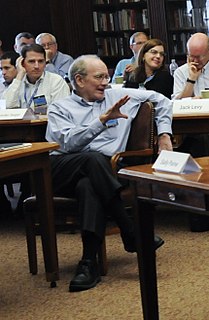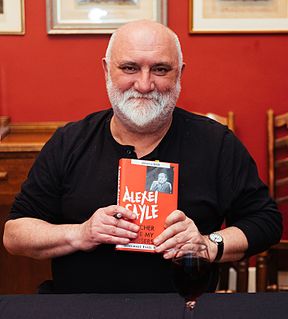A Quote by Masha Gessen
Most Russians actually were living much better by the end of the 1990s than by the beginning of the 1990s. Most Russians were no longer confronting food shortages.
Related Quotes
You must understand, the leading Bolsheviks who took over Russia were not Russians. They hated Russians. They hated Christians. Driven by ethnic hatred they tortured and slaughtered millions of Russians without a shred of human remorse. It cannot be overstated. Bolshevism committed the greatest human slaughter of all time. The fact that most of the world is ignorant and uncaring about this enormous crime is proof that the global media is in the hands of the perpetrators.
For 40 years we were led to think of the Russians as godless, materialistic and an evil empire. When the Cold War ended, we suddenly discovered that Russia was a poor Third World country. They had not been equipped to take over the world. In fact, they were just trying to improve a miserable standard of oppressive living, and couldn't. They had to spend too much on arms build-up. We didn't win the Cold War; we bankrupted the Russians. In effect, it was a big bank exhausting the reserves of a smaller one.
When Russians were having troubles, the Space Shuttle supported the Space Station Mir bringing up much needed supplies and replacements, critical spares, really. That they were able to keep their space station going for much longer than they would have without us. So, I think that shows the value of international cooperation.
[In 1951] we were also told that the Russians could be parachuting from planes over our town at any time. These were the same Russians that my uncles had fought alongside only a few years earlier. Now they had become monsters who were coming to slit our throats and incinerate us. It seemed peculiar. Living under a cloud of fear like this robs a child of his spirit. It's one thing to be afraid when someone's holding a shotgun on you, but it's another thing to be afraid of something that's just not quite real.
I think the Russians basically don't think the North Koreans and the Iranians have the capabilities to get weapon systems that can threaten them, or that if they do the Russians know how to handle them and that that's the reason that it's all the more important that Russians be involved in the sale of high-end conventional weapons, the Bushehr nuclear reactor in the case of Russia and Iran, and similar kinds of relationships.
When I worked as a prosecutor in Richmond, Virginia in the 1990s, that city, like so much of America, was experiencing horrific levels of violent crime. But to describe it that way obscures an important truth: for the most part, white people weren't dying; black people were dying. Most white people could drive around the problem.
It is the first time since 1993 that Russians have come out into the streets without an explicit permission from the government to do so. The main difference between the protests of 2011-2012 and these protests today is that they didn't have permits. These were - the people who were coming out into the streets were very young people, for the most part, who knew that they were all risking arrest. It's an extraordinary event.
We thought that the odds of things working OK were up in the upper 90 percent or we wouldn't have gone. But the - there were some problems cropped up on the flight but was able to take care of those OK and - although they were things that we hadn't really trained that much for. But it was the time of the Cold War and so there were was a lot of pressure on the - to get going and the Russians were claiming that they were - Soviets were claiming they were ahead of us in technology.
































